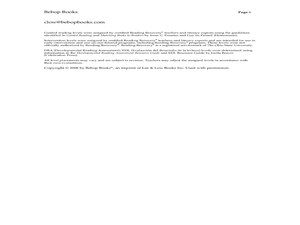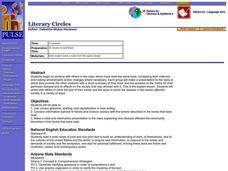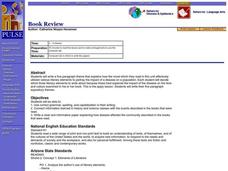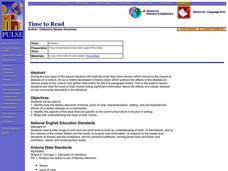Curated OER
Diaries From the Holocaust
Sixth graders find similarities and differences in two different diary entries. In this Holocaust history meets literary skills lesson, 6th graders read the diary of a soldier or prisoner from the the Auschwitz concentration camp and...
Curated OER
Evaluate Problem-Solving in the Context of Culture and Time-frame
Students examine literary elements in non-fiction literature. In this problem solving lesson, students read Rosa Parks, My Story and Beyond the Limits. Students make oral presentations based on the causes and effects, conflicts, and...
Curated OER
Guided Reading: Shapes Where We Play
Students discover shapes on a playground. In this guided reading lesson, students discover new vocabulary words related to shapes as they read Shapes Where We Play. In small groups, students use picture clues and one to one matching to...
Curated OER
The Great Big Especially Beautiful Easter Egg
Young scholars make predictions about the book The Great Big Especially Beautiful Easter Egg by doing a picture walk. In this comprehension lesson plan, students read the book, see if their predictions were right, and draw pictures of...
Curated OER
The Life and Times of Tomie dePaola
First graders research information about the author Tomie dePaola. In this author studies instructional activity, 1st graders use the computer to find information about Tomie dePaola's life and writing accomplishments. Students create...
Curated OER
My Spacecraft to Saturn
Students discover problems that NASA must deal with on a daily basis. They work together to think of solutions and sketch their own idea of a spacecraft. They discover the concept of engineering.
Curated OER
Using Scholastic News to Introduce the Net
Third graders log on to the net, type in the address for Scholastic and browse the subjects for the week. They select one area of interest and generate five interesting facts about the article.
Curated OER
Problem-Solving Decision: Relevant Information: Problem Solving
In this relevant information activity, students read the word problem and then use the steps of understand, plan, solve and look back to complete the problem.
Curated OER
Dr. Teeth and Dr. Gums To The Rescue
Second graders role play as dentists researching teeth and their care. They create a slide show showing how a character, Bear, can take care of this teeth explaining habitats, diets and teeth.
Curated OER
Literary Circles
Students use correct grammar, spelling and capitalization in their writing. They connect information acquired in history and science classes with the events described in the books that were read. Students make a clear and informative...
Curated OER
Seeing Is Believing
Students research and describe the stories of Thomas Jefferson, Meriwether Lewis and William Clark. They analyze historical sources from different points of view and present an analysis of two historical contexts.
Curated OER
A Man of Integrity and Courage
Students read one of the most important articles in modern medical history on the importance of conducting research in an ethical manner that includes participants who give informed consent.
Curated OER
A Sense of Place
Students identify and describe one or two places significant to them using vivid language. They describe one of those important places in accurate, evocative language showing an original perspective.
Curated OER
Citizens for Responsible Change
Third graders write a petition to a school figure, get signatures from other students, share the petition with the appropriate authority, and then work as leaders to carry out the group's solution.
Curated OER
Earth Day
Third graders utilize technology to access, analyze, interpret and communicate information about Earth Day.
Curated OER
Beneath the News: Who's Doing What to Whom, and Who Cares?
Students investigate the differences between various forms of media (print, radio, TV, Internet). They determine the target audience for each and compare exposure around the world. They write a short story and share it with the class.
Curated OER
The Four Seasons with "Charlotte's Web"
Students explore the characters and plot of the story, "Charlotte's Web" through the twenty-two lessons of this unit. Characters, facts, and details of the story are recalled and discussed and form the basis of several activities in this...
Curated OER
What Do I See When I Picture Saturn?
Students create their own Saturn Discovery logs. They draw pictures of the planet and its founder. They share their drawings and writings with partners.
Curated OER
What Do I See Now When I Picture Saturn?
Students complete their study of Saturn and its moons. They reflect in writing what they have gathered from the lessons. They draw pictures and add captions to them. They share their work with the class.
Curated OER
Book Review
Learners write a five paragraph theme that explains how the novel which they read in this unit effectively utilized various literary elements to portray the impact of a disease on a population. They then decide which three literary...
Curated OER
Time to Read
Students identify how the literary elements of theme, point of view, characterization, setting, and plot illustrate the effects of a certain disease on a community. They identify the aspects of the book that are specific to the...
Curated OER
Reporting Live From...
Young scholars examine the many disasters in West Virginia. In this US history lesson, students write about and give an oral presentation of one of the disasters as if they were reporters.
Curated OER
The Time I Got Lost
Third graders go through the writing process but substitute paper and pencil with the computer to create a story about "The Time I Got Lost".
Curated OER
Author, Author!
Third graders, in groups, select and research a favorite studenT author or illustrator. They answer questions about the author, conduct research and prepare a PowerPoint presentation with their findings.
Other popular searches
- Nonfiction Text Features
- Nonfiction Text Structures
- Types of Nonfiction Text
- Features of Nonfiction Text
- Fiction and Nonfiction Text
- Nonfiction Text Elements
- Infer Nonfiction Text
- Parts of Nonfiction Text
- Summarizing Nonfiction Texts
- 6 Nonfiction Text Structure
- Inquiry and Nonfiction Text
- Reading Nonfiction Text

























